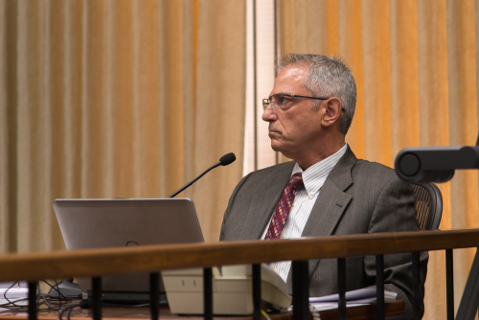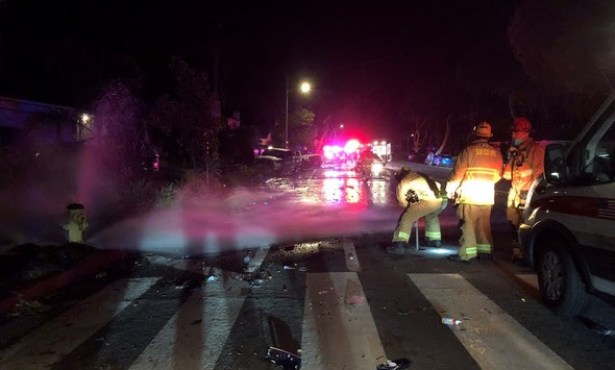‘Sprinters’ Caught in Cross Fire of City RV Crackdown
Chamber of Commerce and Homeless Advocate Find Selves on Same Side of Issue

Come September 5, city police will begin ticketing popular high-profile vans — often described as “Sprinters” — as well as recreational vehicles (RVs), long favored by the quasi-homeless, that are parked on city streets without a permit. City Attorney Ariel Calonne, who spearheaded the new ordinance language, estimated there are 1,063 Sprinter vans within city limits whose owners could be affected. That doesn’t count those driven by commuters and visitors.
When the council sought to crack down on RV dwellers nearly two years ago — at the instigation of upper Eastside residents upset by clusters of RV campers showing up on their streets — Calonne sought to craft an enforcement tool based on the size of the vehicles rather than the socioeconomic status of their occupants. He argued they constituted traffic safety hazards because they blocked views. In so doing, Calonne inadvertently wound up also banning from street parking a new breed of tall vehicles popular with building contractors, surfers, and many small businesses. Only after the council voted in favor of this blanket ban eight months ago did the Sprinter community surface, outraged to realize they were also affected.
Calonne sought to delay enforcement in order to create a permitting process for those who rely on such vehicles for work. Based on public comment at this Tuesday’s council meeting, it would appear Calonne failed to persuade many skeptics despite obviously exhaustive exertions.
For the first time ever, longtime homeless-civil-rights advocate Peter Marin and Chamber of Commerce chief Ken Oplinger found themselves on the same side. Oplinger said the ordinance should be “killed.” Marin has repeatedly vowed to sue. Oplinger expressed outrage that innocent small-business owners have been caught up in an effort, which he supports, to target RV dwellers. Marin complained the poor and disabled living in RVs would not be able to pay the inevitable accumulation of parking tickets — or the $1,700 required to get their impounded vehicles out of hock. These people, he charged, would wind up on the streets. “I don’t think you want to do this,” he said.
Only two councilmembers — Cathy Murillo and Gregg Hart — agreed with him. The other five argued that Calonne had done yeoman’s work trying to accommodate the Sprinter community. Permits could be obtained by anyone with a business license to park on city streets for up to 10 days during any three-month period. Councilmember Frank Hotchkiss expressed little sympathy for the self-described small business owners. First off, “obey the law,” he said. “If you have problems with that, you need to look into the mirror.”
The council did vote, however, to dramatically reduce the fees that City Hall planned to charge oversized-vehicle owners for on-street parking permits. Initially, the amount proposed was $650. The council reduced that to $100 for the first vehicle and $50 for every addition.
Initially, much of the controversy surrounding the ordinance focused on the RV owners who parked at night in various parking lots as part of a city-sanctioned transitional housing program run by New Beginnings. Where could these clients go during daylight hours and be safe from parking tickets? Many months of effort to secure 40 daytime parking spaces yielded only eight. Mayor Helene Schneider reported that 10 new spaces may have been found, and with “a little more elbow grease,” perhaps the 40 spaces needed could be located.
The rationale behind the ordinance is that the bigger vehicles — defined as anything wider than 80 inches, taller than 82 inches, or longer than 25 feet — are a public nuisance in terms of traffic safety. Oplinger from the Chamber of Commerce noted that city traffic engineers couldn’t cite a single accident caused by these vehicles. When neighborhood activists demanded new stop signs, he added, they had to show that a documented and not just hypothetical problem existed.
A representative from Cox Communications complained that under the new ordinance, 14 Cox employees wouldn’t be able to take their work vans home and park on city streets. These workers, she noted, frequently responded to late-night emergency-service calls and needed their vans. “We’re not talking about people watching Gilligan’s Island at 2 in the morning,” she said.
Under the new ordinance language, Cox vans would be exempt from the parking restrictions, but the home-parking option is finished. Councilmember Randy Rowse responded that public streets can’t be used for private car storage. When it was over, about the only person happy was Fred Sweeney, the upper Eastside neighborhood agitator who led the charge. As for the contractors using Sprinter vans, Sweeney complained they were choking his neighborhood streets as well. “I’m saying I’m not sympathetic to their dilemma,” he declared.



